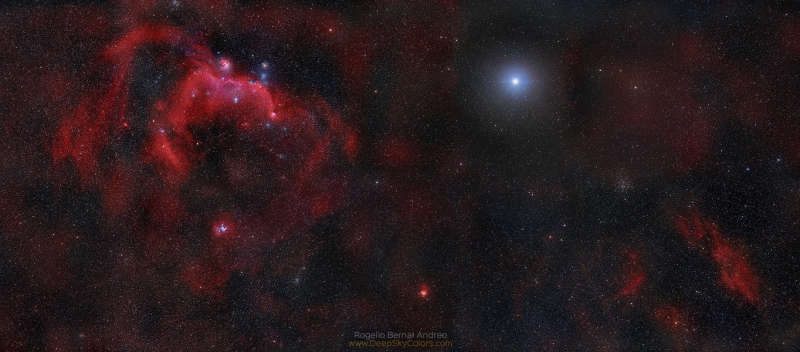
|
Credit & Copyright: Rogelio Bernal
Andreo (Deep Sky Colors)
Explanation:
This broad, beautiful mosaic spans almost 20 degrees across
planet Earth's sky.
The nebula-rich
region lies near the edge of the Orion-Eridanus
supperbubble, filled with looping, expanding shells of gas and dust embedded
in molecular clouds near the plane of the Milky Way Galaxy.
Recognizable at the left is the expansive
Seagull Nebula,
composed of emission nebula NGC 2327, seen as the seagull's head,
with the more
diffuse IC 2177 as the wings and body.
Some 3,800 light-years away, the wings of the Seagull Nebula
spread about 240 light-years, still within our
local spiral arm.
The bluish light of
Sirius,
alpha star of Canis Major and
brightest star in the night, easily dominates the scene at right
but shines from a distance of only 8.6 light-years.
Study the big picture and you should
also be rewarded with star cluster
Messier 41,
also known as NGC 2287, not to
mention the mighty Thor's Helmet.
|
January February March April May June July August September October November December |
| ||||||||||||||||||||||||||||||||||||||||||||||||
NASA Web Site Statements, Warnings, and Disclaimers
NASA Official: Jay Norris. Specific rights apply.
A service of: LHEA at NASA / GSFC
& Michigan Tech. U.
Based on Astronomy Picture
Of the Day
Publications with keywords: Sirius - emission nebula
Publications with words: Sirius - emission nebula
See also:
- Sharpless 249 and the Jellyfish Nebula
- APOD: 2025 December 17 Á W5: The Soul Nebula
- APOD: 2025 December 9 Á The Heart of the Soul Nebula
- APOD: 2025 September 19 Á The NGC 6914 Complex
- APOD: 2025 September 10 Á The Great Lacerta Nebula
- APOD: 2025 July 21 Á Cats Paw Nebula from Webb Space Telescope
- APOD: 2025 July 16 Á The Rosette Nebula from DECam
